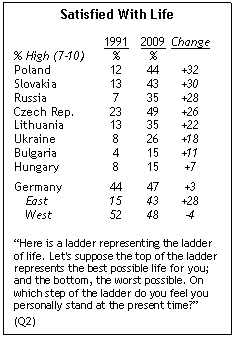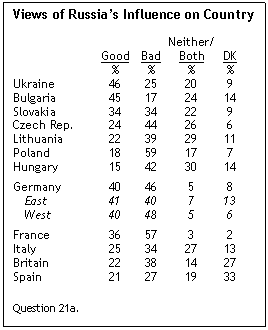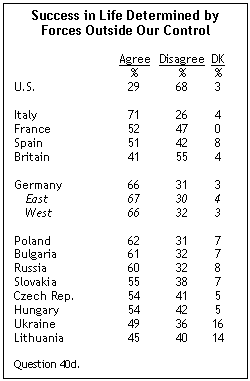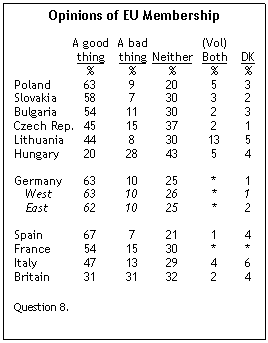Overview

Nearly two decades after the fall of the Berlin Wall, publics of former Iron Curtain countries generally look back approvingly at the collapse of communism. Majorities of people in most former Soviet republics and Eastern European countries endorse the emergence of multiparty systems and a free market economy.
However, the initial widespread enthusiasm about these changes has dimmed in most of the countries surveyed; in some, support for democracy and capitalism has diminished markedly. In many nations, majorities or pluralities say that most people were better off under communism, and there is a widespread view that the business class and political leadership have benefited from the changes more than ordinary people. Nonetheless, self reported life satisfaction has risen significantly in these societies compared with nearly two decades ago when the Times Mirror Center1 first studied public opinion in the former Eastern bloc.

The acceptance of — and appetite for — democracy is much less evident today among the publics of the former Soviet republics of Russia and Ukraine, who lived the longest under communism. In contrast, Eastern Europeans, especially the Czechs and those in the former East Germany, are more accepting of the economic and societal upheavals of the past two decades. East Germans, in particular, overwhelmingly approve of the reunification of Germany, as do those living in what was West Germany. However, fewer east Germans now have very positive views of reunification than in mid-1991, when the benchmark surveys were conducted by the Times Mirror Center for the People & the Press. And now, as then, many of those living in east Germany believe that unification happened too quickly.

One of the most positive trends in Europe since the fall of the Wall is a decline in ethnic hostilities among the people of former communist countries. In a number of nations, fewer citizens say they hold unfavorable views of ethnic minorities than did so in 1991. Nonetheless, sizable percentages of people in former communist countries continue to have unfavorable views of minority groups and neighboring nationalities. The new poll also finds Western Europeans in a number of cases are at least as hostile toward minorities as are Eastern Europeans. In particular, many in the West, especially in Italy and Spain, hold unfavorable views of Muslims.
Concern about Russia is another sentiment shared by both Eastern and Western Europeans. A majority of the French (57%) and 46% of Germans say Russia is having a bad influence on their countries; this view is shared by most Poles (59%) and sizable minorities in most other Eastern European countries. The exceptions are Bulgaria and Ukraine, where on balance Russia’s influence is seen as more positive than negative.

As for the Russians themselves, there has been an upsurge in nationalist sentiment since the early 1990s. A majority of Russians (54%) agree with the statement Russia should be for Russians; just 26% agreed with that statement in 1991. Moreover, even as they embrace free market capitalism, fully 58% of Russians agree that it is a great misfortune that the Soviet Union no longer exist. And nearly half (47%) say it is natural for Russia to have an empire.
These are among the major findings of a new, 14-nation survey by the Pew Research Center’s Global Attitudes Project that was conducted Aug. 27 through Sept. 24 among 14,760 adults. The survey, which includes nations in Eastern and Western Europe, as well as the United States, reexamines many of the key issues first explored in the 1991 survey conducted by the Times Mirror Center, the predecessor of the Pew Research Center for the People & the Press.
Varied Reactions to Democracy and Free Markets

While the current polling finds a broad endorsement for the demise of communism, reactions vary widely among and within countries. In east Germany and the Czech Republic, there is considerable support for the shift to both a multiparty system and a free market economy. The Poles and Slovaks rank next in terms of acceptance. In contrast, somewhat fewer Hungarians, Bulgarians, Russians and Lithuanians say they favor the changes to the political and economic systems they have experienced, although majorities or pluralities endorse the changes. Ukraine is the only country included in the survey where more disapprove than approve of the changes to a multiparty system and market economy.
In Hungary, there is clear frustration with the current state of democracy, despite the public’s acceptance of the shift to a multiparty system. More than three-quarters of Hungarians (77%) are dissatisfied with the way democracy is working in their country. This may be due in part to an overwhelmingly dismal national mood: About nine-in-ten think the country is on the wrong track (91%) and that the economy is in bad shape (94%). Disenchantment with political elites is especially strong in Hungary, where only 38% believe voting gives them a say in politics. And even more than other publics included in the survey, Hungarians are frustrated by the gap between what they want from democracy — such as a free press, free speech and competitive elections — and what they believe they currently have.
Across virtually all of these former communist countries, with the notable exception of the former East Germany, the patterns of acceptance of political and economic changes mirror what was evident from the very start of the political and economic upheavals of two decades ago. Younger, better educated and urban people tend to be more accepting of changes and register greater gains in life satisfaction than do older people, the less well educated and those living in rural areas.
In Russia, for example, majorities of those younger than 50 years of age approve of the changes to a multiparty system and a free market system. But older people are far less approving; among those ages 65 and older, just 27% express positive views of each of these changes. Similar disparities in acceptance are evident by education in Russia and among most of the other former communist publics surveyed.
That is not the case, however, in the former East Germany, where both older and younger people — as well as the better educated and less educated — overwhelmingly endorse the political and economic changes they have experienced. And while about as many east Germans say their former country was overwhelmed and taken by West Germany as said this in 1991, an increasing proportion of east Germans say that reunification has improved their lives. Fully 63% of those questioned now say their lives are better as a result of unification; just 48% felt that way in 1991. Moreover, about eight-in-ten of those living in the former East Germany say they favor the unification of Germany. Those in the former West Germany are equally accepting of unification.
Life Gets Better Ratings

Opinions among east Germans about the impact of unification on their lives are consistent with one of the most striking trends observed in the new survey. People in former communist countries now rate their lives markedly higher than they did in 1991, when they were still coming to grips with the massive changes then taking place. This is true even in countries where overall levels of satisfaction with life — as well as positive assessments of political and economic changes — are significantly lower than in the most upbeat of the nations surveyed.
Czechs, Poles, Slovaks and east Germans report the most satisfaction with their lives and posted the greatest gains over the past two decades. Russians, Ukrainians and Lithuanians also judge their personal well-being much better than they once did, and they view their lives more positively than do Hungarians and Bulgarians. However, even those two downbeat publics show improvements in self-assessments of life compared with 1991.

While the current survey finds people in former communist countries feeling better about their lives than they did in 1991, the increases in personal progress have been uneven demographically, as has been acceptance of economic and political change. There are now wide age gaps in reports of life satisfaction. In Poland, for example, half of those younger than age 30 rate their lives highly, compared with just 29% of those ages 65 and older. These gaps were not evident in 1991, when all age groups expressed comparably negative views of their lives. The same pattern is evident among all of the former communist publics surveyed.

An urban-rural gap also is evident in life satisfaction in two principal republics of the former Soviet Union included in the poll — Russia and Ukraine — as well as in Bulgaria and Hungary. In Ukraine, for example, 30% of urban dwellers express high satisfaction with their lives, compared with just 17% of those residing in rural areas. These disparities in reports of well-being were not apparent two decades ago. Then, on average, people were less happy, but there were no significant demographic differences in their opinions.
The demographic gaps in well-being among the publics of former Iron Curtain countries were suggested by reactions to the end of communism two decades ago. It was the young, the better educated and the urban populations who were cheering. How older, less well educated and rural people would adapt was then identified as one of the principal challenges to acceptance of democracy and capitalism. This remains the case, especially in Russia and Ukraine, where people who now rate their lives well voice the strongest support for democratic values, while those less satisfied are the least disposed to the new values.
Indeed, the prevailing view in Russia, Ukraine, Lithuania, Slovakia, Bulgaria and Hungary is that people were better off economically under communism. Only in the Czech Republic and Poland do pluralities believe that most people are now better off. Furthermore, the consensus in many of these countries is that ordinary people have benefited far less than have business owners and politicians.
Nonetheless, many people in former communist countries broadly endorse the free market economy. This is particularly the case in countries where sizable numbers of people rate their lives better than they did in surveys two decades ago. But in countries where people do not register as much progress since 1991, there is much less unanimity about the benefits of the free market.
Acceptance of Democratic Values

The survey also shows substantial differences in acceptance of democratic values among people in former communist countries. While majorities in most countries approve of the transition to a multiparty system, it remains a rocky transition in many countries. The appeal of a strong leader over a democratic form of government is evident in Russia, Ukraine, Bulgaria, Lithuania and Hungary. Only in Poland, the Czech Republic, Slovakia and the former East Germany do most people believe that a democratic form of government is the best way to solve the country’s problems.
The embrace of political rights and civil liberties is also varied and disparate across countries in Eastern Europe and the former Soviet Union. On every dimension studied, more people say they value these rights and liberties than say they enjoy them.
A fair judiciary is the value most prized in the former communist countries surveyed. And in every country in the region, large numbers say that right does not prevail. Freedom of speech, a free press and even honest elections are given somewhat lower priority in most societies, especially Russia.
Frustrations with the democratic experience are clearly evident in a number of countries. In Hungary, relatively large numbers prize the ability to criticize the state and want press freedom and honest elections, but only small percentages say these conditions prevail. In Ukraine, where support for democracy is tenuous by many standards, very few say that honest elections or a fair judicial system describe their country well.
A general conclusion that can be drawn from the poll’s results suggests that Russians express the least enthusiasm for democratic values, while the most acceptance is expressed by those in the former East Germany, closely followed by the Poles and Czechs.
Corruption, Crime Concerns Widespread
There is a good deal of agreement across former Eastern bloc publics concerning the major problems facing their countries. As might be expected, large majorities express negative views of their economies, but this also is the case for Western Europeans and Americans. In fact, of the 14 publics included in the survey, the Poles render the most positive economic report: 38% describe their country’s economy as very or somewhat good.

Beyond the economy, crime, corruption and drugs are widely seen as major problems in each of the former communist countries surveyed. The environment, the poor quality of schools, and the spread of AIDS and other infectious disease are also common concerns in all countries.
Concerns about people leaving the country are especially high in the former East Germany, Bulgaria and Lithuania. Throughout Eastern Europe, people generally express more concern about emigration than immigration. However, relatively few Russians cite emigration as a major problem. The Russians express greater concern about terrorism than any other Eastern European public.
Views of Minorities and Ethnic Conflicts
Conflict among ethnic groups is viewed as a problem in several former communist countries, especially Russia, Hungary, the Czech Republic and Slovakia. These tensions are reflected in the relatively large percentages that hold unfavorable opinions of minority groups within their countries. However, in almost all nations, less hostility is expressed toward most minority groups and other nationalities than in 1991.

The Roma, or Gypsies, continue to stand out as the most widely disliked ethnic group. More than eight-in-ten Czechs (84%) hold an unfavorable view of them, as do 78% of Slovaks and 69% of Hungarians. Many of the expressed antagonisms reflect historic enmity with neighboring peoples, or long-standing dislike of religious or ethnic minorities. In Hungary, 33% have an unfavorable opinion of Romanians, and 29% say they dislike Jews. Many Poles have a negative opinion of Russians (41%), Ukrainians (35%) and Jews (29%). A sizable number of Lithuanians hold unfavorable views of Poles (21%), but many more dislike Jews (37%). More than one-in-four Slovaks (27%) express a negative opinion of Jews.
Czechs are well liked in Slovakia and vice versa. However, Czechs and Slovaks have differing views of the breakup of Czechoslovakia — on balance, Slovaks think the split was a good thing by a margin of 49% to 39%; Czechs, by a margin of 53% to 40%, mostly think it was a bad idea.
Ukrainians have an overwhelmingly positive view of Russians living in their country (84%), but many fewer like Georgians (54%). A significant number of Russians (32%) have an unfavorable view of Ukrainians residing in Russia, but even more give Georgians a negative rating (53%).
Dislike of minority groups is not limited to Eastern Europeans. Roughly a quarter of the French have an unfavorable opinion of North Africans, which is comparable to negative opinions of Muslims in Britain (27%) and Turks in Germany (30%). In the West, Italians hold the most negative views toward minority groups — 69% say they dislike Muslims and 84% have negative views of the Roma. Negative views toward these two groups run high in Spain as well — 46% have an unfavorable opinion of Muslims and 45% say this about Roma.
Concerns About Russia

Views of Russia differ widely across the surveyed countries. Many of Russia’s neighbors in Eastern Europe see its influence as a bad thing, perhaps reflecting concern over resurgent nationalism in Russia.
Nearly six-in-ten Poles (59%) see Russia’s influence as negative, the highest percentage of any country in the region. In the Czech Republic, Hungary and Lithuania, pluralities see the Russian influence on their countries as a bad thing. In contrast, more Bulgarians and Ukrainians see Russia’s impact as positive than negative. In Western Europe, the balance of opinion is that Russian influence is negative, although many in Spain and Britain have no opinion on the subject.
Wider Values Divides

The long-existing transatlantic divide in attitudes toward the role of the state in society has grown over the past two decades. In nine of the 13 European countries surveyed, fewer people today than in 1991 think that people should be free to pursue their life’s goals without interference from the state. Only in Britain and Italy have the proportions expressing this view increased. However, Italians and the British are still more supportive of an active role for the state in society than are Americans. The least support for a laissez-faire government is in Lithuania (17%) and in Bulgaria (23%).
Similarly, while Europeans are generally less fatalistic than they were in 1991, Americans remain far more individualistic than Europeans. Fewer than a third (29%) of Americans surveyed believe success in life is pretty much determined by forces outside their control. Majorities in 10 of the 13 European countries surveyed think they have little control over their fate. Publics in nine of the 13 European nations surveyed are more individualistic today than they were in 1991.
Views of the EU and NATO
European opinion of the European Union is generally good, but, in the wake of the recent economic crisis, there is some evidence of disgruntlement. While two-thirds of the Spanish (67%) and more than six-in-ten Germans (63%) and Poles (63%) think their country’s EU membership is a good thing, only a slim majority (54%) of the French and a plurality of the Italians (47%) agree.
Frustration with the EU is greatest in Hungary, where only one-in-five people (20%) think their country’s membership has been a good thing and about seven-in-ten (71%) say their economy has been weakened by European economic integration. A strong majority of Bulgarians (63%), as well as 55% in France, 54% in Britain, and a plurality in Italy (41%) agree that their country has been weakened economically by integration.

British wariness of the Brussels-based European Union persists and could be worsening. The British are evenly split on whether membership in the European club is a good thing. And the proportion of the British population that thinks the EU has had a good influence on the way things are going in their country is lower in 2009 than in 2002. That is also the case in France and Italy.
Since the 1991 Times Mirror Center survey, the European Union has grown from 12 nations to 27. Support for further enlargement among the publics in the 11 EU member states surveyed is mixed. Large majorities favor Iceland’s EU membership within the next decade. And backing of Croatia’s application is almost as strong. Smaller majorities or pluralities in most countries also support membership ambitions by Ukraine, Serbia and Georgia.
The weakest backing and the strongest opposition is for Turkey’s long-standing effort to join the union. Notably, in Germany, the EU’s richest member and long the paymaster of EU enlargement, majorities oppose EU membership not only for Turkey but also for Georgia, Serbia and Ukraine.
NATO, the transatlantic security organization that celebrated its 60th anniversary this year, draws favorable reviews in the 12 NATO member countries surveyed.
Notably, slightly more than half of Americans (53%) express a favorable opinion of NATO — the lowest percentage among NATO countries surveyed.
Finally, while NATO is committed to eventual membership for Ukraine, majorities in only three of the 12 NATO members surveyed support such inclusion in the next 10 years. About half of Ukrainians (51%) themselves actually oppose joining. Also, majorities in both Ukraine (51%) and Russia (58%) express unfavorable opinions of NATO.



